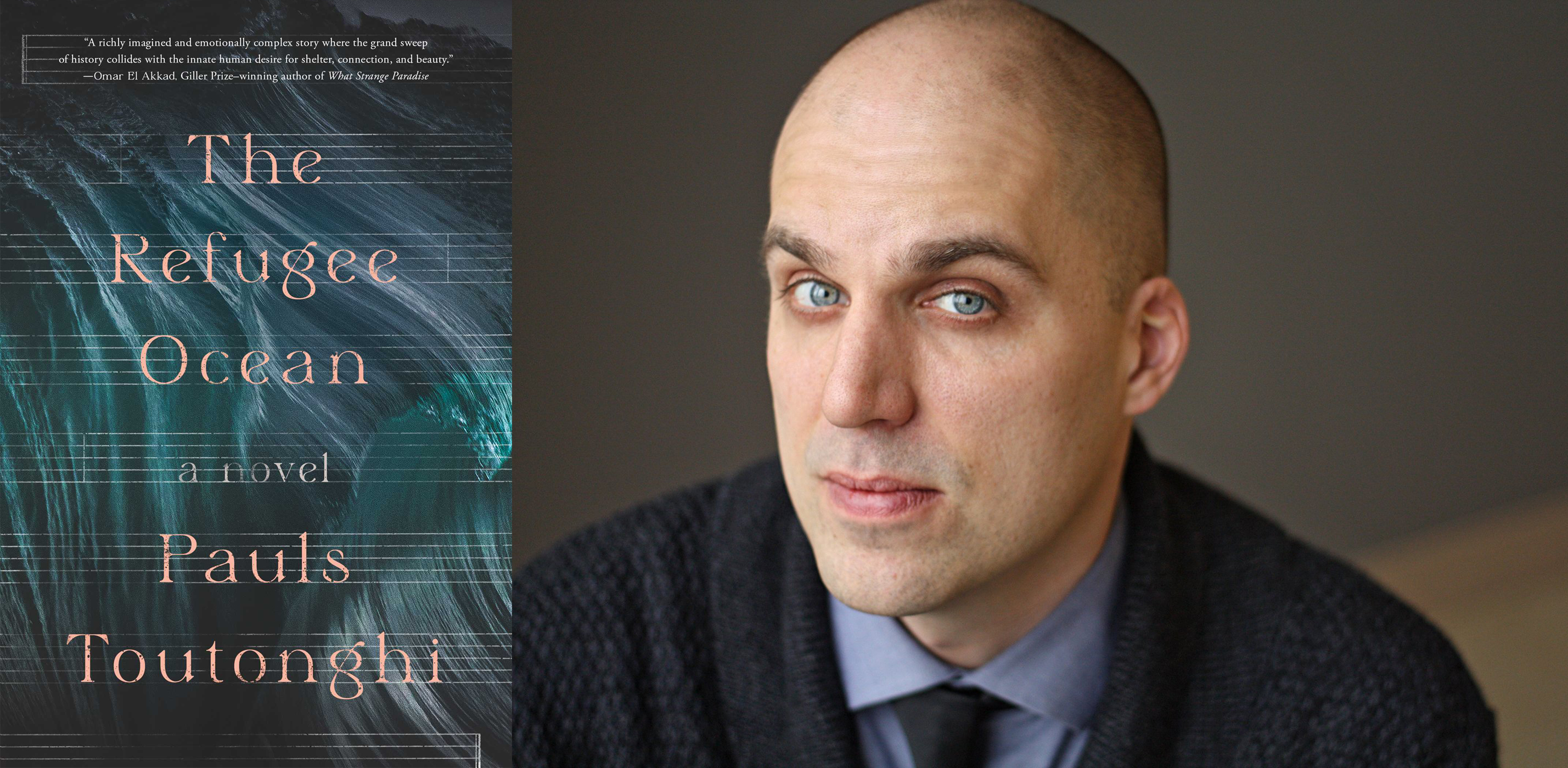Two Refugees Build a Rhapsodic Connection Despite Oceans of Difference and Time
Photograph of author Pauls Toutonghi.
Pauls Toutonghi dedicates his thoughtful novel “The Refugee Ocean” to his cousin Marguerite, one of three main characters whose life Toutonghi skillfully interweaves with the story of Naim, a young Syrian boy. Confronted by the loss of several members of his family and his fingers in a bombing, Naim experiences the war with his mother and an elderly American model who faces her death with benevolent grace. Artfully crafted, Toutonghi twines these disparate three lives under the universal reaffirmation of music and the disastrous global ramifications of the tobacco industry.
The novel’s first scene opens with the 2014 tragedy of Naim’s family in Aleppo. In only five pages, Toutonghi vividly illustrates the everyday hardships of the Syrian war, contrasting with the picture of a loving family. Despite the danger of snipers, Naim’s father has spent the night walking to obtain water for his family. When Naim discovers the bowl of water next to his bed, his immediate response is to play a happy song on his Casio, though his mother hushes him not to wake his father. Even though Naim is desperately hungry, he shares his breakfast of one fig with his baby sister.
A bomb scene could not possibly be more tragically poetic as Toutonghi describes the moment Naim hands his baby sister to his younger brother seconds before the bombing: “In that moment, Naim’s brother lived a full life’s tenderness.” The novel follows Naim and his mother’s arduous journey across the border into the bureaucratic quagmire of the refugee camps before arriving in America. At each stop, the grieving young boy struggles with his impossible effort to be a ‘man’ for his mother in a new and completely unfamiliar environment. He occasionally finds strength in the ghostly imaginings of his father and how he would advise or console him. Alive yet traumatized, Naim’s fragile sense of hope and obligation prevails over his utter loneliness and sense of failure. When he learns of a student winning a music scholarship out of the camp, his angry outbursts are utterly understandable to the reader but sadly not to those who are there to help him. The racism of Trump’s America confuses Naim because he also finds such generosity and humor in America.
At 23 in 1948 Beirut, Marguerite, an aspiring composer, is trapped by family obligations. Set against the all too familiar background of a banking crisis forcing people into poverty and the instability caused by the Occupation of Palestine, Marguerite’s father pressures his daughter into an engagement to the cadaver-like nephew of the Lebanese Prime Minister as a means of saving his tobacco business. Toutonghi does not shy away from highlighting the patriarchal hypocrisy of Lebanese culture through the actions and behaviors of Marguerite’s father, brother, and fiancé. However, he simultaneously celebrates Arab culture, lending the novel an engaging complexity. When Marguerite accidentally bumps into the legendary Oum Kalthoum after one of her concerts, they share a backstage cigarette. Surrounded by family members continually trying to corral her into marriage, Marguerite blurts out her problems to her idol. The legendary singer advises Marguerite to “find a way to be yourself, and the world will show you the path.” For Marguerite, that path opens up when she meets Adolfo, the handsome and romantic son of a Cuban tobacco farmer. Their love story and her musical career also play out under the dark shadow of global capitalism and economic oppression. This suspense novel is a genuine page-turner, and any spoilers would deprive the reader of its unique pleasure.
The aging yet still feisty Annabel, the third character in the novel, houses Niam and his mother upon their arrival in America. Annabel also carries some ghosts with her. As a young secretary bored with life and enthralled with movies, particularly Lauren Bacall, she is discovered by a modeling scout who recruits her to advertise cigarettes made in Cuba. What begins as a modern Cinderella story ends in a dangerous political impasse. Although the finer points of Cuban politics are beyond Annabel’s understanding, the landscape exposes her to poverty and the violence that follows oppression. At first, impressed by the luxury of Cuba compared to her penny-pinching life in America, she quickly grasps the levels of immorality in poverty. In an unlikely parallel with Naim’s mother, she also accepts an exchange of sex for favors with her handsome but married lover with open eyes. When he tries to have a peasant arrested for stealing sandwiches, she silently tries to intervene, not knowing that the woman has already escaped. By chance, she meets Marguerite in Cuba, and again, without any spoilers in a suspenseful story, Marguerite teaches Annabel that “her life was a gift.” Her dramatic experiences in Cuba give Annabel a beautiful understanding of Naim, which recognizes him as a fellow human being who only needs kindness, respect, and a full belly to reach his potential. When she discovers him stealing food, instead of punishing him, she enlists him in her final indulgences in chocolate and gently tricks him into evolving into a grateful young man who can respect himself.
This article appeared in Al Jadid Magazine, Vol. 28, No. 85, 2024 and Inside Al Jadid Reports, No. 94, 2024.
Copyright © 2024 AL JADID MAGAZINE

